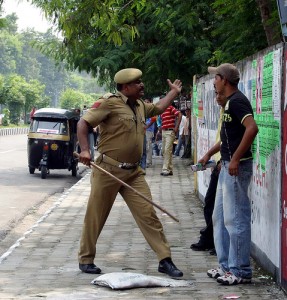The other day, Kiran Bedi, the generally respected police officer (now retired) was on a talk show on television. She was an invited guest on a program which was discussing police brutality. The context was where in U.P, the police brutality which we have now come to take for granted reached a nadir when they beat up a six or seven year old girl in Etawah. She had apparently stolen an amount of Rs 280.00 and was caught. Kiran Bedi did not of course say that the police were doing the right thing. But her statement that the police were an underpaid, over worked force who tended to get angry and then ventilate it on any one who came their way came pretty close to retelling an old story from my school days.
That story is all about how a man came back from office one evening annoyed because his boss had shouted at him. upset with his wife because his tea wasn’t waiting for him when he got home, he shouted at his wife, who turn, later in the evening yelled at their son because he was taking too long over his home work. The son bade his time and next morning kicked the family dog hard in the stomach on his way out to school. the wheel turned full circle when the husband on his way to work a couple of hours later, trod on the dog’s tail who in turn snapped and bit the man on his ankle starting off a fresh cycle of feuding.
Jokes apart, Kiran Bedi’s evidence sounded pretty much like this. Sure the police are underpaid and over worked and are subject to all manner of political interference that further undermines their work. But by their manner of functioning, the police have dome nothing much to improve their image of an institution of almost uniform loathing.
A police station should be a place of protection but instead it feels extremely unsafe and unwelcoming, a place most people want to avoid. Beating, torture and illegal arrests are common, so common that complaints about them are few.
A Noida police station officer blandly told a research team from the Peoples’ Union for Civil Liberties that a suspect always needs `thukai pitai’ (sound trashing) to tell the truth. Brutality is so institutionalized that People in general have an acquired fear, however little it may be, towards the police. Children are frightened by the parents by telling that they would call the police if they do not eat food; do not obey them. The policemen are pictured as cruel people by films.

The police of course have a history of ruthless suppression of the population that they have inherited from the British regime but sadly even after so many decades after independence the police machinery has not evolved very much from the colonial police, including in the police weapon of choice – the lathi.
At a time, when there is so much of terror and insecurity that is coming from the outside, one would expect the police to be an institution where one could turn to for safety, protection and comfort. that is the way it is in other countries ; that is the way of a civilized society – that you turn to the State and arguably its most visible instrument – the police for safety and security – but alas – not yet so in India. Here it would seem, one is better off, the further one is from the police.



